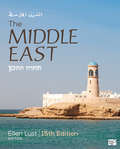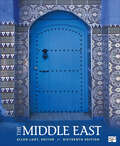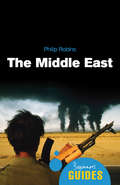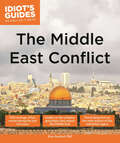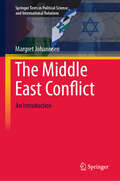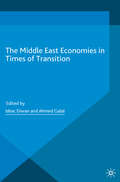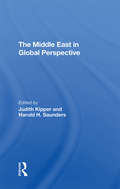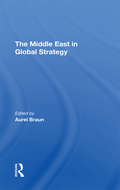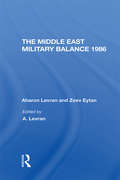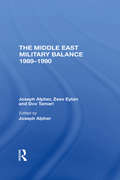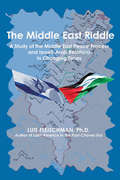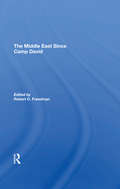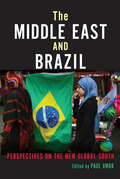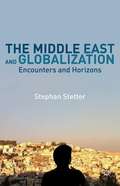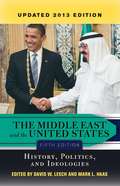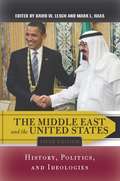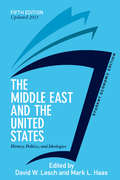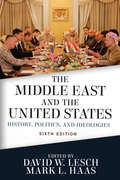- Table View
- List View
The Middle East
by Ellen LustIn the more succinct Fifteenth Edition of The Middle East, editor Ellen Lust brings important new coverage to this comprehensive, balanced, and superbly researched text. In clear prose, Lust and her contributors explain the many complex changes taking place across the region. All country profile chapters now address domestic and regional conflict more explicitly and all tables, figures, boxes, and maps have been fully updated with the most recent data and information. This best-selling text not only helps you comprehend more fully the world around you, but it also enables you to recognize and formulate policies that can more successfully engage the Middle East.
The Middle East
by Ellen LustIn the more succinct Fifteenth Edition of The Middle East, editor Ellen Lust brings important new coverage to this comprehensive, balanced, and superbly researched text. In clear prose, Lust and her contributors explain the many complex changes taking place across the region. All country profile chapters now address domestic and regional conflict more explicitly and all tables, figures, boxes, and maps have been fully updated with the most recent data and information. This best-selling text not only helps you comprehend more fully the world around you, but it also enables you to recognize and formulate policies that can more successfully engage the Middle East.
The Middle East
by Ellen M. LustIn the The Middle East, Sixteenth Edition, Ellen Lust brings important new coverage to this comprehensive, balanced, and superbly researched text. In clear prose, Lust and her outstanding contributors explain the landscape of this changing region by examining both regional trends and individual countries. The Sixteenth Edition adds a chapter on Sudan, and other country chapters have been streamlined and fully updated to reflect domestic, regional, and international changes of the past three years. This best-selling text offers a wealth of information to help readers not only comprehend more fully the world around them, but also recognize and formulate policies that can more successfully engage the vitally important Middle East.
The Middle East
by Ellen M. LustIn the The Middle East, Sixteenth Edition, Ellen Lust brings important new coverage to this comprehensive, balanced, and superbly researched text. In clear prose, Lust and her outstanding contributors explain the landscape of this changing region by examining both regional trends and individual countries. The Sixteenth Edition adds a chapter on Sudan, and other country chapters have been streamlined and fully updated to reflect domestic, regional, and international changes of the past three years. This best-selling text offers a wealth of information to help readers not only comprehend more fully the world around them, but also recognize and formulate policies that can more successfully engage the vitally important Middle East.
The Middle East
by Philip RobinsStuffed with historical background, real-life examples, profiles of key figures from Nasser to Gadaffi, and popular jokes from the region, The Middle East: A Beginner's Guide is easy-to-read and full of insight. Philip Robins is University Lecturer in Middle East Politics at Oxford University. He is the author of A History of Jordan and has previously worked as a journalist for the BBC.
The Middle East Conflict (Idiot's Guides)
by Alan AxelrodThe Middle East is often a pressure cooker of upheaval and the threat of war. Complex dynamics are at work, both culturally and politically, and understanding conflict in this region starts with understanding both recent and ancient events. Noted history writer, Alan Axelrod, PhD, breaks down the stereotypes and biases and helps readers not only understand what has been happening during the last 100 years, but why it has happened, who was involved, and what might happen in the future. Supplemental maps are also included.
The Middle East Conflict: An Introduction (Springer Texts in Political Science and International Relations)
by Margret JohannsenThis textbook deals with the Middle East conflict as a key element of international relations. The origins of the conflict and its international dimensions, the major Israeli-Arab wars, attempts at a solution, peace plans and visions for the future are presented in a concise manner. Extensive map material illustrates the findings.The English translation of this book, originally in German, was facilitated by artificial intelligence. The content was later revised by the author for accuracy.
The Middle East Economies in Times of Transition (International Economic Association Series)
by Ishac DiwanDiwan and Galal looks at the structure and prospects of the Middle East economies after the 2011 Uprisings, focusing on issues of economic growth, inequality, the impact of oil, and the unfolding political transitions. On the growth question, the book looks into the extent of structural transformation of the economy, the political economy reasons for the lack of structural change, and the external conditions in the EU and in the GCC that underpin the lack of structural change. On inequality, the book offers new measures of equality of opportunity in human development and in the job market, and it also reviews the complex political economy of subsidy removal. Regarding natural resources, the volume provides three innovations: connecting the notion of 'oil curse' to the global phenomena of asset bubbles; evidence that resource curse effects do not rise monotonically with the size of the resource rent, but rather, according to an inverted U shape; and an extension of the concept of rent to the other non-oil rents that are also predominant in the region. Finally, the volume places the political transition in the region in a global perspective using various methods – theoretical, comparative, and empirical, and it explores the relationship between democracy in its variety of forms and economic development.
The Middle East Economies in Times of Transition (International Economic Association)
by Ishac DiwanDiwan and Galal looks at the structure and prospects of the Middle East economies after the 2011 Uprisings, focusing on issues of economic growth, inequality, the impact of oil, and the unfolding political transitions. On the growth question, the book looks into the extent of structural transformation of the economy, the political economy reasons for the lack of structural change, and the external conditions in the EU and in the GCC that underpin the lack of structural change. On inequality, the book offers new measures of equality of opportunity in human development and in the job market, and it also reviews the complex political economy of subsidy removal. Regarding natural resources, the volume provides three innovations: connecting the notion of 'oil curse' to the global phenomena of asset bubbles; evidence that resource curse effects do not rise monotonically with the size of the resource rent, but rather, according to an inverted U shape; and an extension of the concept of rent to the other non-oil rents that are also predominant in the region. Finally, the volume places the political transition in the region in a global perspective using various methods – theoretical, comparative, and empirical, and it explores the relationship between democracy in its variety of forms and economic development.
The Middle East In Global Perspective
by Judith Kipper Harold SaundersWell before events in the Soviet Union and Eastern Europe dramatized the rapidity with which a new political world is evolving and before the Gulf War sharpened the focus on the Middle East agenda, scholars and policymakers alike were searching for different concepts for addressing the intractable problems facing the Middle East. Even though the re
The Middle East In Global Strategy
by Aurel Braun Avner Yaniv Edwin H Fedder Gerald SteinbergThis book emphasizes the vital links between international politics and strategy and provides a comprehensive analysis of strategic interests of the major international actors in the Middle East. It contends that the policies of the superpowers toward the Middle East are fragmented and unproductive.
The Middle East Maze: Israel and Her Neighbors
by David A. RauschThe Ottoman Empire; The Jewish State; Developments; Israel Middle East; Egypt and Jordan; Syria and Lebanon; Iraq and Iran; Libya PLO; The Arabian Peninsula; Israel
The Middle East Military Balance 1986
by Aharon Levran Joseph Alpher Zeev Eytan Daphne RazThis annual reference provides a statistical study of military trends in the Middle East and a collection of essays analyzing the details and strategic significance of events in the region. This fourth annual volume of the Middle East Military Balance covers the calendar year 1986. Strategic developments in the Middle East, a region of high geostrategic stakes and deep-rooted conflicts, redound vigorously on both regional and global peace and stability.
The Middle East Military Balance 1989-1990
by Joseph Alpher Zeev Eytan Dov TamariNow in its seventh year, this annual review provides a detailed database on military forces and strategic developments in the Middle East. It offers statistics on populations, resources and military infrastructures, on armed forces and the military capacity of each state in the region, and on the Palestinian Liberation Organization. This year's volume contains essays on the activities of major armies in the Middle East, as well as in-depth analyses of fundamental strategic trends of particular relevance during the 1990s.
The Middle East Riddle: A Study of the Middle East Peace Process and Israeli-Arab Relations in Current Times
by Luis FleischmanA foreign policy expert provides a fresh and accessible analysis of the Israeli-Palestinian peace process, its complex obstacles, and possible solutions.Luis Fleischman is a sociologist and Middle East policy expert who has served as a senior advisor to government officials and members of congress. In The Middle East Riddle, he examines obstacles to achieving peace that transcend the negotiations process, mostly relying on a broad sociological analysis. Over the years, the conflict between Israelis and Palestinians has seemed like an intractable conflict of opposing narratives. Some argue that the Palestinians want to put an end to the State of Israel, while others believe Israelis want to impose their sovereignty via settlement expansion. However, the history shows that the two sides have been very close to an agreement. Fleischman examines a variety of nuanced solutions towards progress. He analyzes the idea of a Palestinian/Jordanian confederacy, as well as a proposed Israeli unilateral withdrawal from most of the West Bank. The book also explores the chances that the Palestinian security establishment, that has worked together with the Israeli security establishment for years, could generate the leadership necessary to restore order.
The Middle East Since Camp David
by Robert O FreedmanSince the Camp David agreements of September 1978, the Middle East has experienced a series of major military and political developments that have affected not just the nations of the region and the two superpowers, but the rest of the world as well. The fall of the Shah of Iran, the Soviet invasion of Afghanistan, the Iraqi invasion of Iran, the assassination of Egyptian President Anwar Sadat, and the Israeli invasion of Lebanon—to name only a few events—have had a major impact. In this volume, a group of internationally recognized scholars, many of whom are present and former U.S. government officials, analyze these Middle Eastern developments from the perspectives of the superpowers, the region in general, and the five major actors during this period (Egypt, Israel, the PLO, Syria, and Iran). Although the individual authors speak from differing perspectives and viewpoints in their analyses, the book as a whole presents a balanced examination of the key developments in the volatile Middle East since Camp David.
The Middle East Today: Political, Geographical and Cultural Perspectives
by Dona J. StewartThe new edition of The Middle East Today provides an accessible and comprehensive introductory textbook for undergraduate students of Middle East Studies, Middle East politics and geography. This updated and revised edition features a host of pedagogical features to assist students with their learning, including; detailed maps and images, case studies on key issues, boxed sections and suggestions for further reading. The book highlights the current issues facing the Middle East, linking them to the rich political, geographical and cultural history of the region. The author examines the crises and conflicts, both current and potential, likely to dominate the region in coming years. The second edition has been fully updated and revised to include discussion of such recent events as: the effects of the Arab Spring Turkey's growing influence in the region the dramatic increase in Iran's nuclear capabilities Usama bin Laden's death and declining support for violent extremist movements in the Middle East. Further supplemented by a companion website containing sample chapters, a selection of maps formatted for use in presentations, and annotated links to online resources and websites, The Middle East Today is an essential resource for all students of Middle East Studies, Middle East politics and geography.
The Middle East and Brazil: Perspectives on the New Global South (Public Cultures of the Middle East and North Africa)
by Paul AmarConnections between Brazil and the Middle East have a long history, but the importance of these interactions has been heightened in recent years by the rise of Brazil as a champion of the global south, mass mobilizations in the Arab world and South America, and the cultural renaissance of Afro-descendant Muslims and Arab ethnic identities in the Americas. This groundbreaking collection traces the links between these two regions, describes the emergence of new South-South solidarities, and offers new methodologies for the study of transnationalism, global culture, and international relations.
The Middle East and Globalization
by Stephan StetterThe Middle East and Globalization discusses past and contemporary political, societal, economic, and cultural trends in the Middle East against the background of comprehensive theories of globalization. The chapters draw on a shared methodological approach, looking at the fractures and horizons of globalization that are shaping the Middle East.
The Middle East and the United States
by David W. Lesch Mark L. HaasThis acclaimed book brings together scholars and diplomats from the Middle East, Europe, and North America to provide an objective, cross-cultural assessment of U.S. foreign policy in the Middle East. This fifth edition has been substantially revised with greater emphasis on current events, including the policies of the Obama administration, Islamist perceptions of U.S. involvement in the Middle East, and the U.S. relationship with Israel, Saudi Arabia, Turkey, and Afghanistan.Updated throughout, this edition also features five new chapters on the superpowers and the Middle East throughout the Cold War; the Bush and Obama administrations and the Arab-Israeli conflict; contemporary U.S.-Syrian relations; the importance of ideology to U.S.-Iranian relations under the last three administrations; and U.S. relations with Al Qaeda.
The Middle East and the United States
by David W. Lesch Mark L. HaasThis acclaimed book brings together scholars and diplomats from the Middle East, Europe, and North America to provide an objective, cross-cultural assessment of U. S. foreign policy in the Middle East. This fifth edition has been substantially revised with greater emphasis on current events, including the policies of the Obama administration, Islamist perceptions of U. S. involvement in the Middle East, and the U. S. relationship with Israel, Saudi Arabia, Turkey, and Afghanistan. Updated throughout, this edition also features five new chapters on the superpowers and the Middle East throughout the Cold War; the Bush and Obama administrations and the Arab-Israeli conflict; contemporary U. S. -Syrian relations; the importance of ideology to U. S. -Iranian relations under the last three administrations; and U. S. relations with Al Qaeda.
The Middle East and the United States
by Mark L. Haas Edited by David W. LeschThe 2013 updated fifth edition of the acclaimed The Middle East and the United States brings together scholars and diplomats from the Middle East, Europe, and North America to provide an objective, cross-cultural assessment of US policy toward the Middle East. Regional experts David W. Lesch and Mark L. Haas include a new chapter dedicated to the events of the Arab Spring and its aftermath, looking with a special eye to the impact on US interactions with the region. The text also features five new chapters discussing the superpowers and the Middle East throughout the Cold War; the Bush and Obama administrations and the Arab-Israeli conflict; contemporary US-Syrian relations; the importance of ideology to US-Iranian relations under the last three administrations; and US relations with al-Qa’ida. Carefully edited and reorganized to place a greater emphasis on current events, The Middle East and the United States provides comprehensive and authoritative coverage of US foreign policy and Middle East political history from the first World War through the Arab Spring and beyond.
The Middle East and the United States, Student Economy Edition: History, Politics, and Ideologies, UPDATED 2013 EDITION
by David LeschLeading scholars and policy advisors provide comprehensive and authoritative coverage of historical events, updated with an entirely new chapter on the Arab Spring and its aftermath.
The Middle East and the United States: History, Politics, and Ideologies
by David W. Lesch Mark L. HaasLesch (Middle East history, Trinity U.) and, new to this edition, Haas (political science, Duquesne U.) present a revised and updated edition of a collection exploring US relations in the Middle East from its inceptions during the Woodrow Wilson administration to close to the present time (i. e. , the book discusses the initial Obama approach to the region, in ten revised chapters, but doesn't address the popular uprisings of 2011 or NATO's regime change policy in Libya). The contributions address overarching regional and general issues, such as Cold War context and the ongoing Arab-Israeli conflict, as well as specific events and policies towards individual countries. Altogether, the coverage is both chronologically and regionally comprehensive. The previous edition's focus on the first Gulf War has been eliminated for this new edition and new chapters have been added on the Cold War, the Bush and Obama administrations' approaches to the Arab-Israeli conflict, US-Syrian relations since 2000, ideology and Iran's American policies (1997-2008), and US relations with al Qaeda. Annotation ©2011 Book News, Inc., Portland, OR (booknews.com)
The Middle East and the United States: History, Politics, and Ideologies
by David W. Lesch Mark L. HaasThe Middle East and the United States brings together scholars and policy experts to provide an empirical and balanced assessment of US policy in the Middle East primarily from the end of World War I to the present. Carefully edited by David W. Lesch and Mark L. Haas, this text provides a broad and authoritative understanding of the United States’ involvement in the Middle East. The sixth edition is significantly revised throughout, including a new part structure and part introductions that provide students with greater context for understanding the history of the United States and the Middle East. The five parts cover the watershed moments and major challenges the United States faces in the Middle East, from the Cold War proxy wars and the Arab-Israeli conflict, to the Gulf wars and the upheaval in the region post-Arab uprisings. Three new chapters-on the Golan negotiations, US-Saudi relations, and the US fight against al-Qa'ida and ISIS-make this the most current and comprehensive book on the United States' involvement in the Middle East
